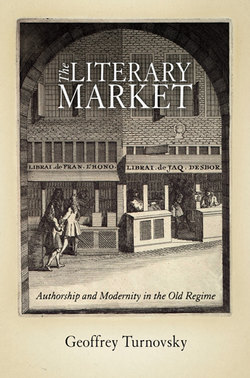The Literary Market

Реклама. ООО «ЛитРес», ИНН: 7719571260.
Оглавление
Geoffrey Turnovsky. The Literary Market
Отрывок из книги
The Literary Market
Authorship and Modernity in the Old Regime
.....
In either case, the intersection of authorship with the privilège system did not manifest the professionalization of literary activities, as many literary histories assume. On the contrary, Charpentier tells another story in which Georges de Scudéry turns to the mechanism in an effort to bolster— perhaps to fabricate—an image of himself as a retired soldier devoting his idle hours to poetry rather than as a writer earning a living from his plays: “Scudéry went to Saint Germain in order to have a privilège issued in his name, in which he has the King say that he commanded Royal Troupes, whereas truthfully, he has never commanded any troupes other than those of the Hôtel de Bourgogne and the Marais, and a few other troupes of provincial actors.”69 The privilège pointed in a wholly different direction, and indeed to quite another cultural reality of which the images of Corneille’s involvement in commercial publication might also be a reflection: not the slow progress of the writer toward professional independence but the evolving stakes of literary legitimacy in the 1630s, in the context of what Alain Viala called “the first literary field.”70
This reality is characterized at least in part by two decisive developments. On one hand, we have what might be called a socialization of intellectual practices epitomized by the emergence of distinctly social qualities like politeness and honnêteté as essential criteria for the evaluation of writers and their works. More exactly, this socialization was an “aristocratization” of letters, with “société” understood in the seventeenth-century meaning recorded by the dictionary of the Académie française, which accentuates the pleasure of leisured interactions and the exclusivity of elite gatherings.71 The process was thus one of the integration of writers into the networks and values of social elites, a process mediated by what Viala calls “institutions of literary life,” such as the Académie, court patronage, and salons. These and other similar bodies offered privileged venues and mechanisms for introducing gens de lettres and their writings into “the Court and high society,” where both authors and their productions would be judged according to emerging worldly criteria.72 Charles Sorel offers an allegorical account of this “New Parnassus,” describing the Muses leaving “their rustic caves for golden palaces where they frequently lived, having been received by the nobility of the age.” Apollo abandoned Pegasus, “an old horse” and “hideous beast,” for a stylish “Carriage.”73
.....